Unit 2 How often do you exercise?Section B 1a-1e课件(共34张PPT)+内嵌音频
文档属性
| 名称 | Unit 2 How often do you exercise?Section B 1a-1e课件(共34张PPT)+内嵌音频 |  | |
| 格式 | pptx | ||
| 文件大小 | 13.5MB | ||
| 资源类型 | 教案 | ||
| 版本资源 | 人教新目标(Go for it)版 | ||
| 科目 | 英语 | ||
| 更新时间 | 2023-08-03 07:39:19 | ||
图片预览

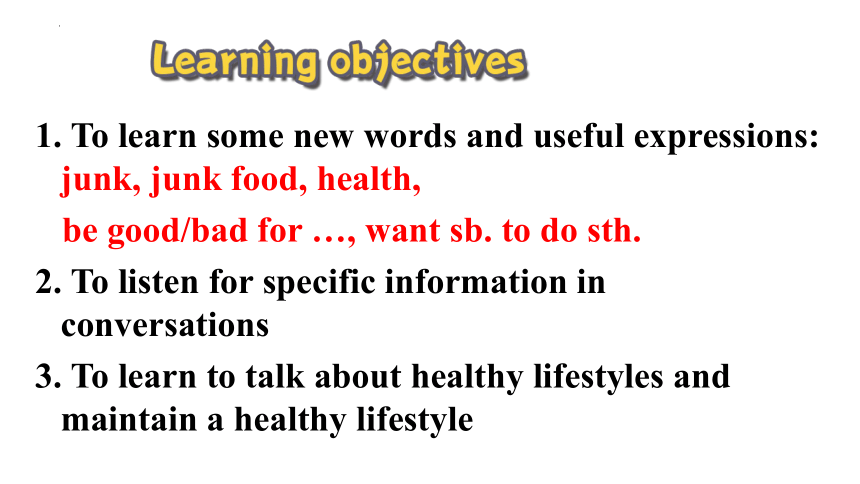
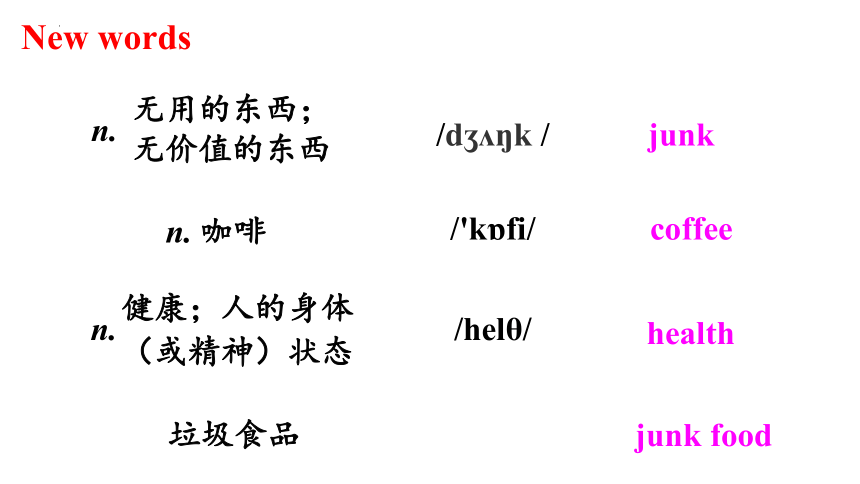
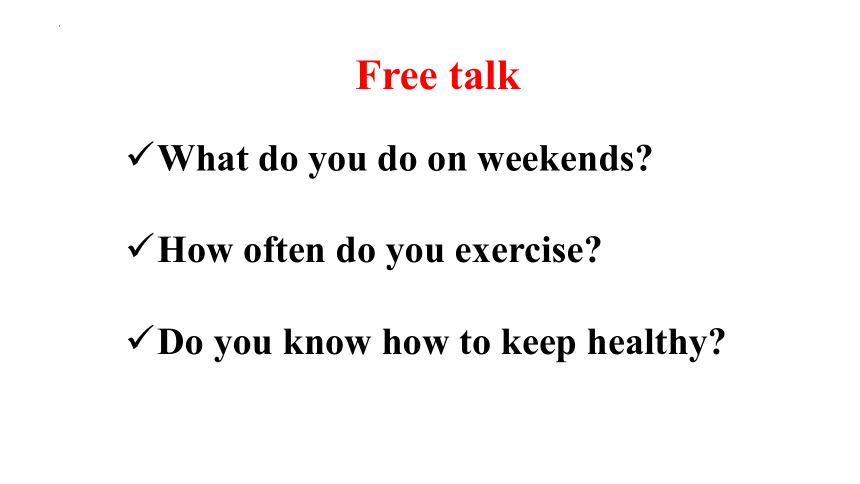
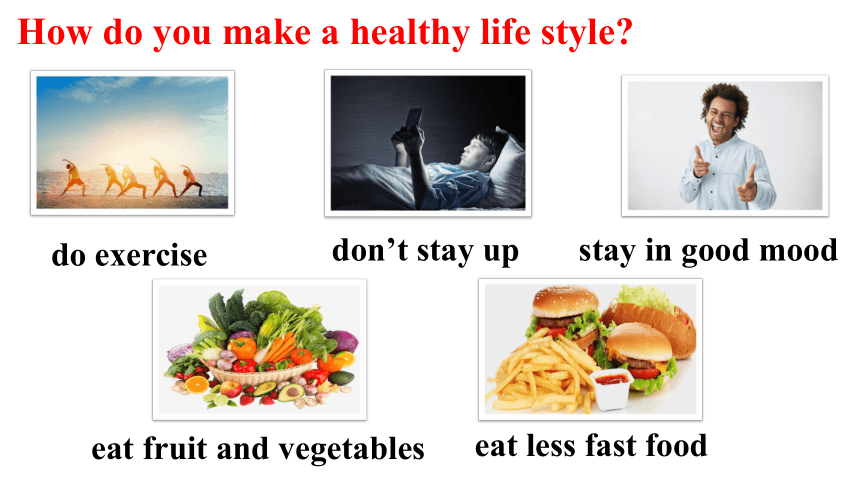

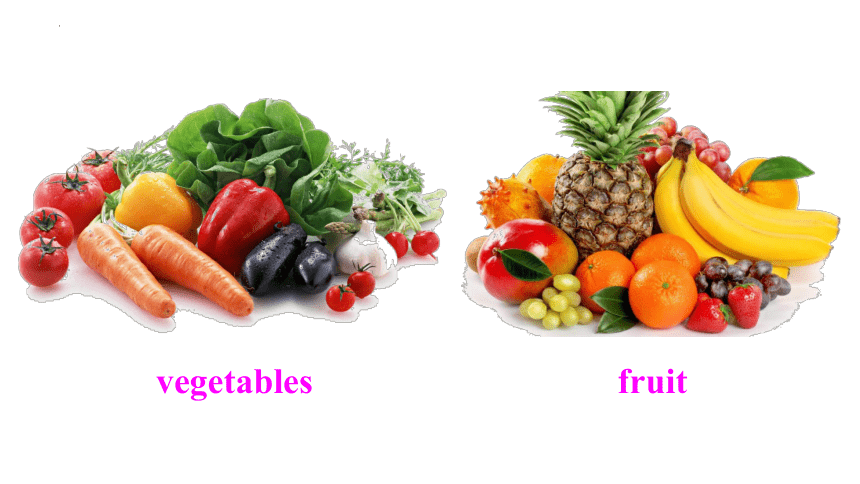
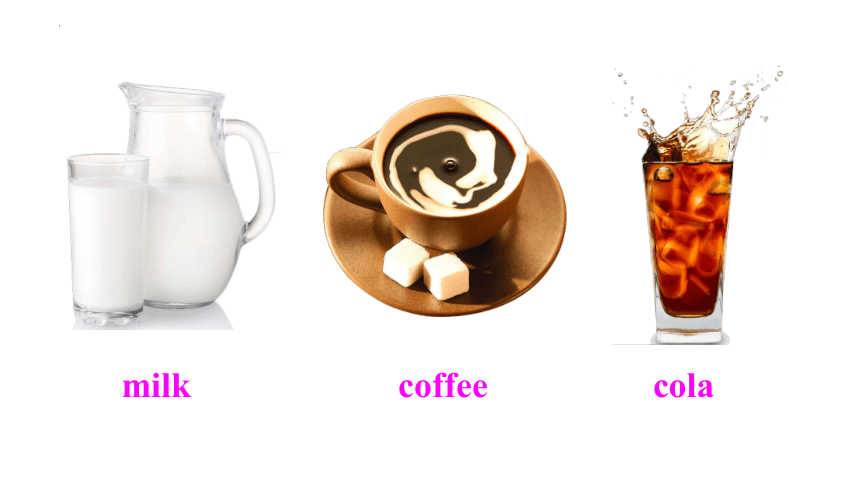
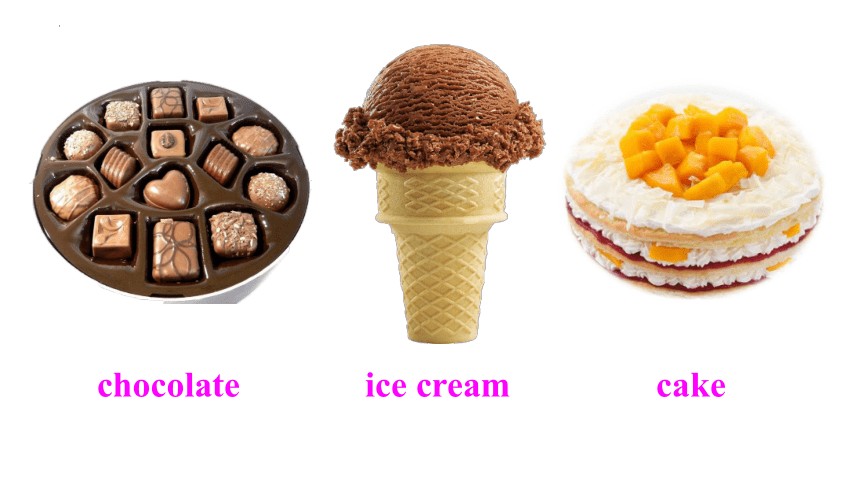

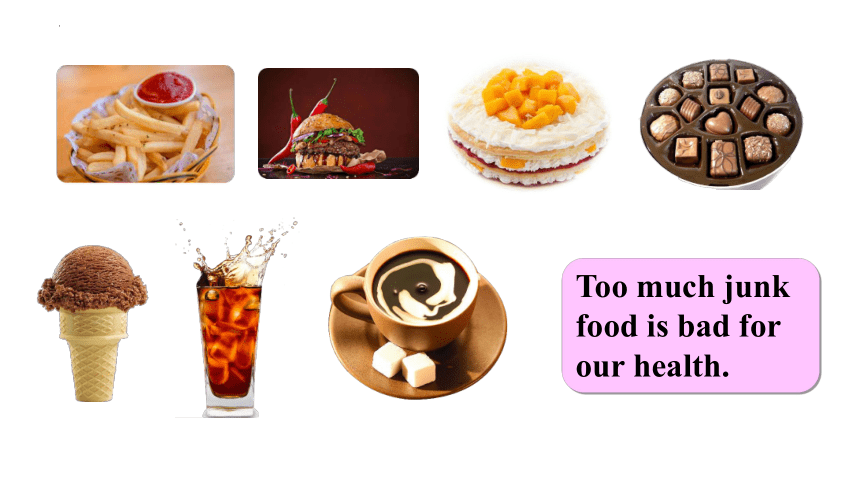
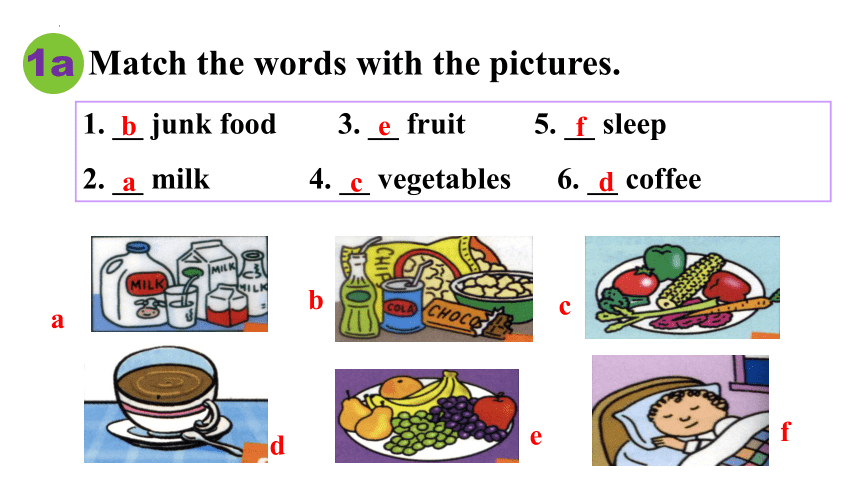
文档简介
(共34张PPT)
Unit 2 How often do you exercise
Section B(1a-1e)
1. To learn some new words and useful expressions: junk, junk food, health,
be good/bad for …, want sb. to do sth.
2. To listen for specific information in conversations
3. To learn to talk about healthy lifestyles and maintain a healthy lifestyle
health
junk food
无用的东西;
无价值的东西
/d k /
junk
n.
n. 咖啡
/'k fi/
coffee
健康;人的身体
(或精神)状态
/helθ/
n.
垃圾食品
New words
Free talk
What do you do on weekends
How often do you exercise
Do you know how to keep healthy
How do you make a healthy life style
do exercise
eat less fast food
eat fruit and vegetables
don’t stay up
stay in good mood
chips
hamburger
vegetables
fruit
milk
coffee
cola
chocolate
ice cream
cake
be good for
our health
Too much junk food is bad for our health.
1. __ junk food 3. __ fruit 5. __ sleep
2. __ milk 4. __ vegetables 6. __ coffee
a
f
c
d
e
b
a
b
c
d
e
f
Match the words with the pictures.
1a
Look at the pictures and name the food. Then put them in the correct columns.
Healthy food Unhealthy food
Ask and answer questions. Use the words from 1a.
1b
A: How often do you drink milk, Liu Fang
B: I drink milk every day.
A: Do you like it
B: No. But my mother wants me to drink it.
She says it’s good for my health.
Let’s guess
If a person has a good habit, what does he/she usually drink and eat
If a person doesn’t have a good habit, what does he/she usually drink and eat
Listen and choose
Tina and Bill are students. Do they have good habits Listen and choose the main idea of the conversation.
The general idea of the conversation is about ____.
healthy food B. unhealthy food
C. eating habits
Listen to an interview about two people’s daily habits. Circle your answer to each question.
Does Tina have good habits Yes. No. I don’t know.
Does Bill have good habits Yes. No. I don’t know.
1c
Listen again. Fill in the blanks in the survey.
Questions Tina Bill
1. How often do you exercise
2.How often do you eat fruit
every day
never
every day
hardly ever
1d
3. How many hours do you sleep every night
4. How often do you drink milk
5. How often do you eat junk food
6. How often do you drink coffee
nine
every day
nine
3 or 4 times a week
never
2 or 3 times a week
never
4 times a day
Interviewer: Hi, Tina and Bill. Let’s start with the
first question. How often do you exercise
Tina: Every day.
Bill: Hardly ever.
Interviewer: How often do you eat vegetables and fruit
Tina: I eat vegetables and fruit every day.
Bill: I sometimes eat vegetables. But I never eat
fruit.
Tapescripts:
Interviewer: OK. How many hours do you sleep
every night
Tina: Nine.
Bill: Me, too.
Interviewer: How often do you drink milk
Bill: Never. I can’t stand milk.
Tina: Oh, I love milk — I drink it every day.
Interviewer: How often do you eat junk food
Bill: I eat it three or four times a week.
Tina: I guess I eat it two or three times a week.
Interviewer: And how often do you drink coffee
Bill: Oh, I drink coffee four times a day.
Tina: I never drink coffee.
Interviewer: Well, thank you very much.
Bill/Tina: You’re welcome.
Student A is the reporter. Student B is Tina or Bill. Ask and answer questions. Then change roles.
A: How often do you exercise
B: I exercise every day.
A: And how often do you…
1e
Think about the following questions and talk about them with your partner. Then share your opinions.
Who has better eating habits, Tina or Bill
Whose lifestyle is better
Why
While-listening
Pre-listening
Warming-up
I think Tina has better eating habits.
She has junk food two or three times a week.
She never drinks coffee and she drinks milk every day.
Because she eats vegetables and fruits every day.
Warming-up
Tina’s lifestyle is better.
She exercises every day.
She is very healthy.
She sleeps nine hours every night.
Who can get better grades
Her healthy lifestyle helps her get good grades.
Good food and exercise help her to study better.
Do a survey
1. How often do you exercise
2. How often do you eat fruit
3. How many hours do you sleep every night
4. How often do you drink milk
5. How often do you eat junk food
6. How often do you drink coffee
Ask your classmates the following questions and then report.
be good for 对……有好处
Milk is good for our health.
1. She says it’s good for my health.
例:牛奶对我们的健康有好处。
她说它(牛奶)对我的健康有好处。
Language points
be bad for 对……有坏处
例:热狗对我们的健康有坏处。
Hot dog is bad for our health.
辨析 be good for/ at/ with
be good at:
擅长……,后接名词代词或v.-ing形式。
be good with:
善于应对……
I’m good at (playing) basketball.
He is good with children.
例:我擅长(打)篮球。
例:他管理孩子有一套。
be good for: 对……有好处
eg.
1)It's bad for your health.
2)Although he is old, he is/stays/keeps in good health.
be/ stay/ keep in good health .
=Although he is old, he is/stays/keeps healthy.
be/stay/keep healthy.
2.health----healthy----healthily
n. adj. adv.
结论:
保持健康→ be/ stay/ keep in good health
=be/stay/keep healthy.
3)If you want to keep healthy, you should eat healthily.
adj.
adv.
拓展:加前缀un构成反义词
喝牛奶
熬夜
吃健康的早餐
做运动
早早上床睡觉
垃圾食品
对某人的健康有好处
有好 / 坏习惯
drink milk
stay up late
eat a healthy breakfast
play sports
go to bed early
junk food
be good for one's health
have good / bad habits
Summary
Pre-listening
Warming-up
Live a healthy life!
Enjoy the happy life!
Unit 2 How often do you exercise
Section B(1a-1e)
1. To learn some new words and useful expressions: junk, junk food, health,
be good/bad for …, want sb. to do sth.
2. To listen for specific information in conversations
3. To learn to talk about healthy lifestyles and maintain a healthy lifestyle
health
junk food
无用的东西;
无价值的东西
/d k /
junk
n.
n. 咖啡
/'k fi/
coffee
健康;人的身体
(或精神)状态
/helθ/
n.
垃圾食品
New words
Free talk
What do you do on weekends
How often do you exercise
Do you know how to keep healthy
How do you make a healthy life style
do exercise
eat less fast food
eat fruit and vegetables
don’t stay up
stay in good mood
chips
hamburger
vegetables
fruit
milk
coffee
cola
chocolate
ice cream
cake
be good for
our health
Too much junk food is bad for our health.
1. __ junk food 3. __ fruit 5. __ sleep
2. __ milk 4. __ vegetables 6. __ coffee
a
f
c
d
e
b
a
b
c
d
e
f
Match the words with the pictures.
1a
Look at the pictures and name the food. Then put them in the correct columns.
Healthy food Unhealthy food
Ask and answer questions. Use the words from 1a.
1b
A: How often do you drink milk, Liu Fang
B: I drink milk every day.
A: Do you like it
B: No. But my mother wants me to drink it.
She says it’s good for my health.
Let’s guess
If a person has a good habit, what does he/she usually drink and eat
If a person doesn’t have a good habit, what does he/she usually drink and eat
Listen and choose
Tina and Bill are students. Do they have good habits Listen and choose the main idea of the conversation.
The general idea of the conversation is about ____.
healthy food B. unhealthy food
C. eating habits
Listen to an interview about two people’s daily habits. Circle your answer to each question.
Does Tina have good habits Yes. No. I don’t know.
Does Bill have good habits Yes. No. I don’t know.
1c
Listen again. Fill in the blanks in the survey.
Questions Tina Bill
1. How often do you exercise
2.How often do you eat fruit
every day
never
every day
hardly ever
1d
3. How many hours do you sleep every night
4. How often do you drink milk
5. How often do you eat junk food
6. How often do you drink coffee
nine
every day
nine
3 or 4 times a week
never
2 or 3 times a week
never
4 times a day
Interviewer: Hi, Tina and Bill. Let’s start with the
first question. How often do you exercise
Tina: Every day.
Bill: Hardly ever.
Interviewer: How often do you eat vegetables and fruit
Tina: I eat vegetables and fruit every day.
Bill: I sometimes eat vegetables. But I never eat
fruit.
Tapescripts:
Interviewer: OK. How many hours do you sleep
every night
Tina: Nine.
Bill: Me, too.
Interviewer: How often do you drink milk
Bill: Never. I can’t stand milk.
Tina: Oh, I love milk — I drink it every day.
Interviewer: How often do you eat junk food
Bill: I eat it three or four times a week.
Tina: I guess I eat it two or three times a week.
Interviewer: And how often do you drink coffee
Bill: Oh, I drink coffee four times a day.
Tina: I never drink coffee.
Interviewer: Well, thank you very much.
Bill/Tina: You’re welcome.
Student A is the reporter. Student B is Tina or Bill. Ask and answer questions. Then change roles.
A: How often do you exercise
B: I exercise every day.
A: And how often do you…
1e
Think about the following questions and talk about them with your partner. Then share your opinions.
Who has better eating habits, Tina or Bill
Whose lifestyle is better
Why
While-listening
Pre-listening
Warming-up
I think Tina has better eating habits.
She has junk food two or three times a week.
She never drinks coffee and she drinks milk every day.
Because she eats vegetables and fruits every day.
Warming-up
Tina’s lifestyle is better.
She exercises every day.
She is very healthy.
She sleeps nine hours every night.
Who can get better grades
Her healthy lifestyle helps her get good grades.
Good food and exercise help her to study better.
Do a survey
1. How often do you exercise
2. How often do you eat fruit
3. How many hours do you sleep every night
4. How often do you drink milk
5. How often do you eat junk food
6. How often do you drink coffee
Ask your classmates the following questions and then report.
be good for 对……有好处
Milk is good for our health.
1. She says it’s good for my health.
例:牛奶对我们的健康有好处。
她说它(牛奶)对我的健康有好处。
Language points
be bad for 对……有坏处
例:热狗对我们的健康有坏处。
Hot dog is bad for our health.
辨析 be good for/ at/ with
be good at:
擅长……,后接名词代词或v.-ing形式。
be good with:
善于应对……
I’m good at (playing) basketball.
He is good with children.
例:我擅长(打)篮球。
例:他管理孩子有一套。
be good for: 对……有好处
eg.
1)It's bad for your health.
2)Although he is old, he is/stays/keeps in good health.
be/ stay/ keep in good health .
=Although he is old, he is/stays/keeps healthy.
be/stay/keep healthy.
2.health----healthy----healthily
n. adj. adv.
结论:
保持健康→ be/ stay/ keep in good health
=be/stay/keep healthy.
3)If you want to keep healthy, you should eat healthily.
adj.
adv.
拓展:加前缀un构成反义词
喝牛奶
熬夜
吃健康的早餐
做运动
早早上床睡觉
垃圾食品
对某人的健康有好处
有好 / 坏习惯
drink milk
stay up late
eat a healthy breakfast
play sports
go to bed early
junk food
be good for one's health
have good / bad habits
Summary
Pre-listening
Warming-up
Live a healthy life!
Enjoy the happy life!
同课章节目录
- Unit 1 Where did you go on vacation?
- Section A
- Section B
- Unit 2 How often do you exercise?
- Section A
- Section B
- Unit 3 I'm more outgoing than my sister.
- Section A
- Section B
- Unit 4 What's the best movie theater?
- Section A
- Section B
- Unit 5 Do you want to watch a game show?
- Section A
- Section B
- Unit 6 I'm going to study computer science.
- Section A
- Section B
- Unit 7 Will people have robots?
- Section A
- Section B
- Unit 8 How do you make a banana milk shake?
- Section A
- Section B
- Unit 9 Can you come to my party?
- Section A
- Section B
- Unit 10 If you go to the party, you'll have a grea
- Section A
- Section B
